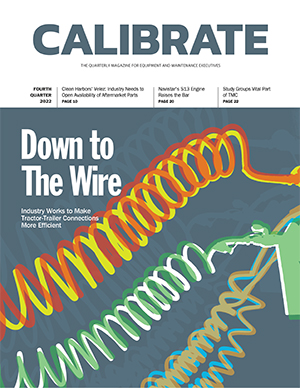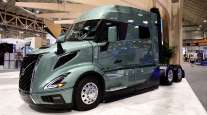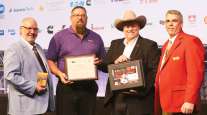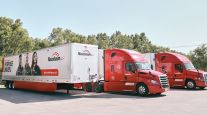Features Editor
Formulate Recap: Homer Hogg of TravelCenters of America
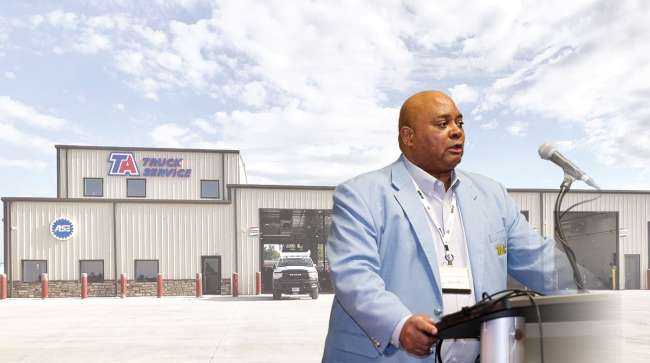
[Find the latest in equipment & maintenance: Explore this quarter's issue of Calibrate]
Earlier this year, as part of our Transport Topics Magazine Event Series, Formulate, we sat down with Homer Hogg, vice president of truck service at TravelCenters of America, to discuss the future of vehicle maintenance.
A recognized leader in the truck service industry serving on numerous boards overlooking technology and maintenance, Hogg provided several insights about where the service industry has been and where it is headed.
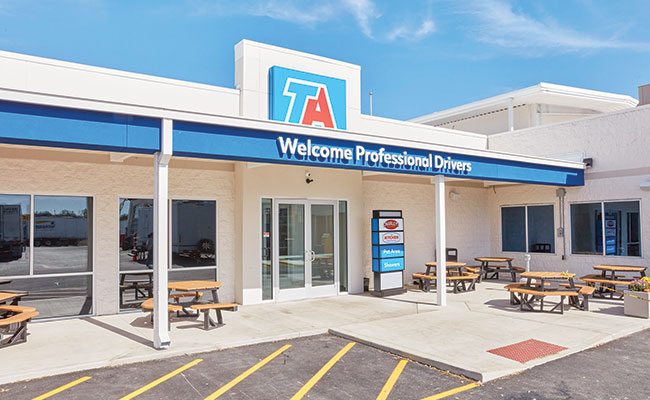
TravelCenters of America
Here are some of the highlights:
Having the EV Maintenance Conversation
It’s not a secret that the industry is currently shifting to electrification. As fleet operations prepare for a world of EVs, the conversation has also moved into what’s next, which is maintenance. Hogg noted via his work with the Technology & Maintenance Council that seeds are currently getting sowed for the conversation about EV maintenance.
“You’re going to see a keen focus on this. We are intimately aware that we have to develop a body of work so that fleets have an opportunity and a timely opportunity to be successful maintaining and operating this equipment,” he said. “Our goal was to continue the buzz and increase the intensity of it. But at the end of the day, to get all hands on deck so that we can develop, create, and publish the right solutions.”
Citing that it’s a daunting task, Hogg said he and others participating in TMC’s study groups have worked to niche down each of the segments of EV maintenance.
“I think you’re going to see subjects like battery maintenance. That’s a big deal. You know, how we’re going to maintain these batteries? What are we going to do with these batteries at the end of their life?” he explained. “That is an issue we have to tackle now and not wait till we get five to 10 years down the road.”
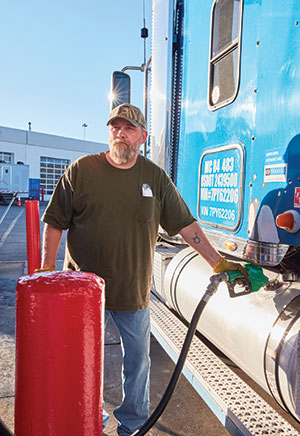
While electric vehicles are the hot topic, diesel remains the dominant source for fleets. (TravelCenters of America)
Hogg also noted that the industry should establish protocols on how to keep technicians and other personnel safe.
“We have to make sure everybody’s safe when they’re interfacing with this equipment,” he said. “We also have operational efficiencies. We have learned right away that the driver can make or break the life of the battery when it’s in motion.”
“There’s a long list of what I call critical subjects that we need to study and we need to make sure we understand the Recommended Practices,” Hogg continued. “Then, there’s another list, what I probably call ‘Stage Two,’ and then beyond that. There’s a huge body of work. I think it’s going to keep TMC and people like myself and [the] study groups busy for maybe even years to come.”
The Development of Diesel Engine Repair
In the 40-plus years Hogg has been in the trucking industry, he understands that even with the new dawn of electric vehicles, diesel is still king.
“We are certainly seeing the evolution of how we maintain diesel engines, for sure. We’re going to be keeping that equipment running for years to come,” he said. “I don’t [have] the magic ball, but I do believe there’s going to be a phasing out of what we know the diesel engine will be like over the next several years. Somebody still must maintain the equipment and it’s still going to dominate the market.”
Hogg contended that much knowledge would be gained from the technology and strategies deployed from EV equipment.
“We’re going to translate some of that learning over to the current diesel engine platform. You’re likely to see some changes in the drive trend,” he said. “That may very well be adapted somewhat from the whole EV strategy. I think what you’re going to see is we’re learning as we go and we’re starting to realize that some of this technology we can use on the existing diesel platform and make it more efficient.”
Watch more of this conversation HERE.
Formulate is part of the Transport Topics Magazine Event Series, which brings to life the people and conversations behind trucking maintenance and technology. The quarterly event series gives leaders in maintenance and technology an opportunity to reexamine their understanding of the industry, and redefine their thinking about the state of trucking tech and modern maintenance shops.
From that point, Hogg expanded, citing segments from battery technology to the research and development that OEMs, developers and engineers can leverage to have a creative impact to the more conventional chassis.
“For the most part, we’re going to get smarter, we’re going to have more data. We’re going to see more virtual type of data coming over so we can make decisions hopefully in a timely way so we can increase the uptime. At the end of day, it’s all about uptime,” he explained. “So, if we can get information, whether it’s a service provider, a dealer, or fleet shop, regardless of where you fit within the industry, it can help us be prepared to keep that equipment running and get that equipment up sooner.
“If it does happen to have a defect, I think what you’re going to see is more remote type of troubleshooting diagnostics,” Hogg continued. “You’re going to see maybe improved lead times on parts and logistics and maybe better leveraging the workflow in the physical base. And if we can preempt that, it’s just going to make everything better. I think that will translate to the diesel engine as well.”
Outsourcing Versus In-House Maintenance
In March, Hogg was part of a learning session about the challenges of choosing between in-house maintenance and outsourcing at American Trucking Associations’ Technology & Maintenance Council 2022 annual meeting. He said the experience was overwhelming in the sense that outsourcing was a subject that was heavily on the mind of industry leaders. Hogg noted that partnerships have their place, and if the industry can understand the needs are from a dealer and fleet perspective that it will go a long way in improving the skills of the technician in the long term.
More Q4 Calibrate
►Making Tractor-Trailer Connections More Efficient
►Five Questions: Ginnapher Velez, Clean Harbors
►Freeze: Making the Electric Transition
►TMC Corner: Recommended Practices are the Foundation of Maintenance
►Baxter: Challenging Truck Makers' Emissions Systems
Explore the Issue!
“There are things like trying to find technicians and retain those technicians, but that’s only part of the challenge. You have to develop them and the skills of your workforce and technicians must evolve with the technology,” he explained. “Fleets are looking for ways to do that and if they can do that with good partners, dealers, service providers and those independents out there, it makes us all better.”
In choosing in-house or outsourcing, Hogg said that the single focus for the service provider to fleet manager is uptime.
“I think that’s going to benefit the consumer who’s really trying to buy a gallon of milk, and may not necessarily understand everything that goes into getting that product into the store,” he said. “We can help control what the end user is paying for that gallon of milk. I think you’re going to see an extreme focus on partnerships out there between fleets and those that provide service and help them keep those vehicles running.”
Changing Landscape of Maintenance
Hogg also explained that while the era of the wrench socket may be replaced with a tablet, that can also translate to better partnerships and better fleet maintenance.
“There was a time when, for example, you can have a technician and they may be a bumper-to-bumper… from the front to the rear of the vehicle. That’s probably not the case today,” he said. “We might want to think we’re like that, but probably we’re stronger in certain areas than we are in others.”
Hogg continued that partnerships with suppliers and parts manufacturers in the beginning of EVs can only help to strengthen preventative maintenance.
“We have great fleets that we do business with and we try to keep an open line of communication so that we understand what they need and we try to deliver that. That goes both ways,” he said. “I really like the way fleets will come to service providers and dealers, sit down and talk about what they need so that we work together to find the right solution to keep that vehicle up and running. I think that is the key as we go forward.”


